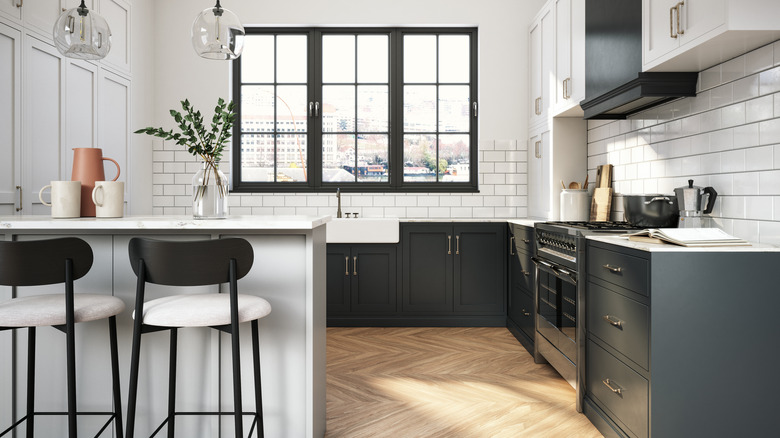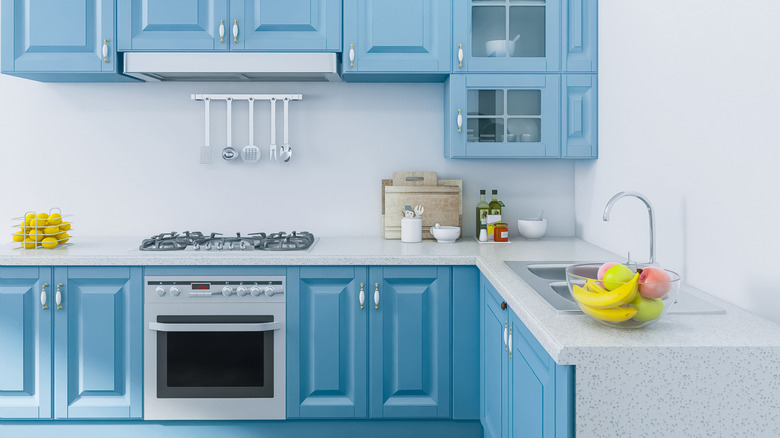Choose The Right Thickness For Your Countertops With These Helpful Tips
Think about your countertops. Did you picture the one in your kitchen? You probably have more countertops than you realize, and most homes do — several in the kitchen; one or more in each of your bathrooms; and maybe more in a bar area, outdoor kitchen, laundry room, or craft room. Odds are that most of those are thinner than the one in your kitchen — the one you thought of before and the one you probably care about the most. There's prestige and perceived beauty wrapped up in kitchen countertops, including the materials they're made of and the thickness of those materials. A standard of 1 ¼ inches has emerged for kitchen countertops, while countertops in bathrooms and other areas tend to be slightly thinner.
Thickness has implications beyond visual appeal, of course. Some materials tend to be cut thicker to ensure a stronger countertop, which can be especially important during installation. Thickness also impacts cost, one of the main reasons one might choose a kitchen countertop thinner than 1 ¼ inches. Getting a handle on the ins and outs of slab thickness is part of the process of getting to know the types of countertops available before a remodel or new construction. Let's take a look at some tips that will help you decide when to use thicker — and thinner — countertops in your home.
When to go with thicker countertops
Thicker countertops aren't just about prestige. The visual weight and impact of your cabinetry should also factor into how substantial you make your countertops. A thin countertop can look out of place with grand, monumental cabinets, just as an overly thick countertop might look silly in an RV. You can also use this trick of perception to create a focal point by using one thicker run of countertop amid a room of thinner materials. And, if you have unusual or very specific design tastes, thicker countertops naturally give you more edge profile options.
There are practical considerations, as well. The strength of thicker slabs makes it possible to create large overhangs for a bar or seating area; thinner materials often can't extend as far. If you're concerned about chipping or cracking with heavy use — or heavy appliances — thicker countertops are able to handle more substantial loads. And, not coincidentally, thicker slabs tend to come with better warranties and higher price tags. To achieve the look of thick countertops without the expense, some fabricators will combine two ¾-inch slabs to create the look of a 3-inch slab.
When to go thinner
Prefabricated countertops and those installed anywhere other than a kitchen are often thinner than 1 ¼ inches. For example, bathroom countertops are usually around ¾ inch. Thinner materials typically come in ¼-, ½-, and ¾-inch thicknesses, often backed with plywood for strength and a thicker appearance. Some newer materials and methods, like carbon fiber-backed slabs, can even strengthen thin pieces enough to practically erase a thick countertop's strength advantages.
Thinner options are lighter, less expensive, and easier to install. They tend to require fewer people to handle, which makes for a cheaper installation. You should also consider thinner materials if your installation requires complicated cuts around objects and obstacles like outlets, sinks, etc. If your decision is mostly driven by cost, keep in mind that you can also use certain edge profiles or a larger perimeter overhang to create the illusion of a thicker countertop while maintaining the benefits of a thinner one.
Thin countertops are naturally more at home in smaller spaces, but they can work well in large rooms for specific applications or a particular effect. The countertops best suited to a wet bar, for example, range from stainless steel to quartz to laminate. Modern interior designs might make use of thinner slabs for sleek cabinetry or waterfall countertops. And, thin materials are more appropriate for vertical installations like backsplashes or fireplace surrounds, where thickness is actually a liability.


